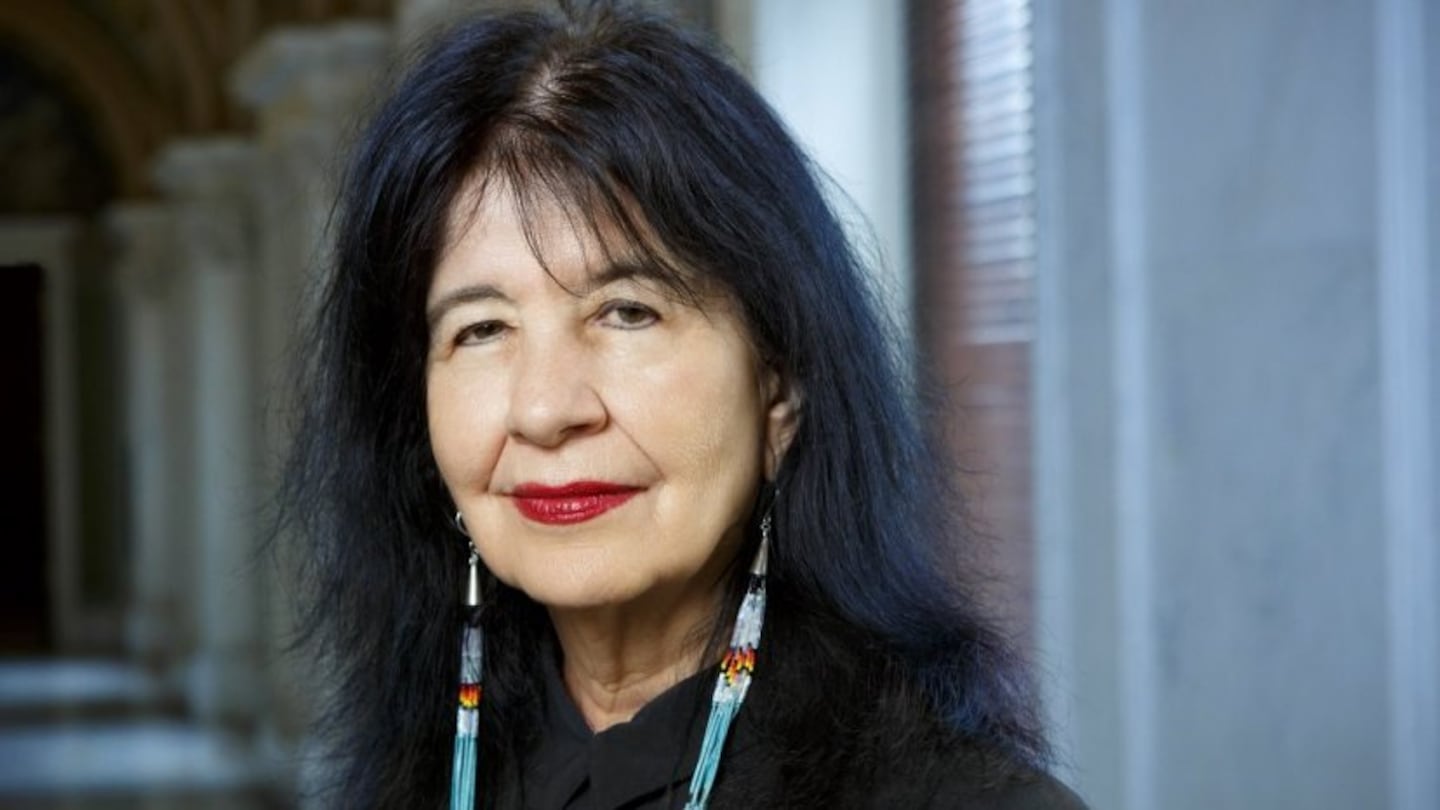A Naive American has become the United States' 23rd poet laureate.
Joy Harjo, a member of the Muscogee Creek Nation, is a poet, musician and playwright who lives Oklahoma. She has been appointed to the prestigious role by the Library of Congress, acting as the country's official poet.
Harjo spoke to Te Ao Māori News about her life, work and what she hopes to achieve as the United States' first indigenous person to hold the title.
Here is Joy Harjo, in her own words:
'The traditional people say that it is by our clans we know ourselves.'
I am a member of the Muscogee Creek Nation, a Mvskoke person. I am also a member of the Oce Vpofv Ceremonial Grounds, and of the Katcv and Wind Clans. I was always “Indian”.
I grew up in a time when we called ourselves “American Indian” but we’ve always called ourselves by our tribal nation identity. The traditional people say however, that it is by our clans we know ourselves.
The Muscogee Creek Nation is essentially a confederacy of many Muscogean tribal groups who gathered together to deal as a united force with foreign governments, like the French, Spanish, Great Britain and then, the Americans.
I grew up in Tulsa, Oklahoma, which was assigned as Mvskoke lands after we were removed illegally from our lands in the southeastern part of the U.S., in the areas of Alabama, Georgia, Florida and Tennessee.
"Speaking is a powerful tool for shaping the world and experience."
Every tribal group is culturally different, with languages that might or might not be related, different lands and climates (which all affect culture).
This last year I have been working with a team of all indigenous poets from the U.S. on an historical anthology of Native poetry: When the Light of the World Was Subdued, Our Songs Came Through: a Norton Anthology of Native Nations Poetry. It will be published next fall.
We have noticed how colonisation was the same and different, depending on history, the kinds of immigrants, and in what period contact occurred.
What is generally the same throughout, is a belief in the land, elements as living beings, a non-hierarchical system of relationship, and an understanding that words, speaking is a powerful tool for shaping the world and experience.
[ Read 'Eagle Poem' by Joy Harjo.Opens in new window ]
"I come from a family in which my ancestors and relatives stood up against oppression."
I notice that in my own writing I tend to be occupied with justice, transformation, in healing.
I come from a family in which my ancestors and relatives stood up against oppression. They were leaders, speakers, and painters on one side. On the other side they were musicians lovers of poetry, and junk car fixers.
The need for justice can easily be overtaken by self-righteousness. I have to watch for that—I began writing poetry as a need to speak the experience of women during the Native rights movements in the early seventies.
Maybe transformation is part of healing. To heal is to transform. I believe in the power of words to heal and inspire.
"The ills of colonisation ... cause physical and mental disease everywhere, including for the coloniser."
There are over 567 tribal groups in the U.S.—we have similar issues and challenges, most arising from the ills of colonisation that cause physical and mental disease everywhere, including for the coloniser!
We are still involved in land rights issues, human rights issues, water rights, the stealing of and murdering of our women. Non-natives can essentially come onto our lands and will suffer no legal consequences because we cannot charge them for crimes.
Of course, I would like to see all this change. I would love to see our children empowered.
[ Read 'Perhaps the World Ends Here' by Joy Harjo.Opens in new window ]
"There is no America without us."
This is a one year position. If I take on a second year, I can then institute a project. I will do this—it’s in the forming stages now, but will involve awareness of Indigenous communities, especially poetry and music of our people—bringing it into a larger public view. Many in the American communities still believe we are dead and gone, or are not fully-fledged human beings, or see us only as flat-lined stereotypes.
For many of our tribal nations, we keep our cultural activities underground, so they will not be stolen or otherwise mined. We live in the cities, in reservations, in many parts of “Indian Country” which are tribal areas that are not called “reservations”—right alongside Western society—and through language programs, other cultural programs, and in the courtrooms, we are asserting our sovereignty. Yet, we are not accepted or seen, we have no place at the table.
I believe my position can be a force for changing these misconceptions, and might be able to help make change. We are human beings. We were fully formed societies with specific cultural gifts just as any other peoples. There is no America without us.
"I remain inspired and feel much aroha for your people."
The Māori have inspired indigenous communities all over the Pacific and in the U.S.—I know many writers of your people, including the beloved writer Patricia Grace and the poet Robert Sullivan.
I visited your people once before in Wellington, Auckland, and Hongoeka Bay, and felt a familiar feeling there, and will be returning in March. I remain inspired and feel much aroha for your people.
In my life I have had the opportunity to visit the communities of indigenous peoples all over the world. There are such connections between us.
Mvto,
Joy Harjo, July 28, 2019. Tulsa, Oklahoma.

